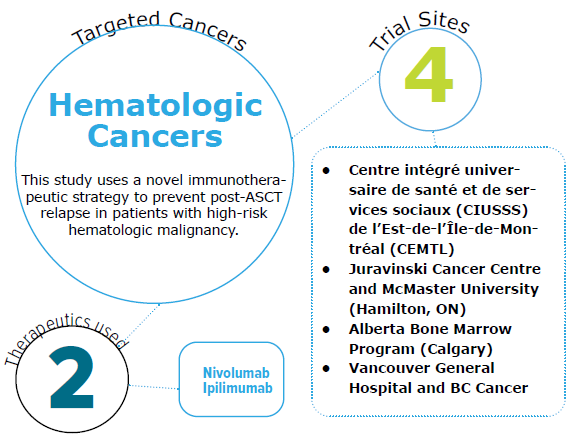An interventional, open-label, nonrandomized dose-escalation phase I multicenter clinical trial of multi-peptide anti-minor histocompatibility antigen immunotherapy for the prevention of relapse in patients with high-risk malignancy eligible for matched related ASCT
Key Information
Who may qualify?
- Patients with treatment-resistant hematologic cancers
- Patients in complete remission
- Patients eligible for allogeneic hematopoietic stem cell transplantation according to local center criteria
- Patients must contain specific human leukocyte antigens (HLAs)
- For full inclusion criteria, click on the link at the bottom of page
Recruitment status
- Not yet recruiting
Key words
- Lymphoid, hematologic, blood cancer, stem cell, AHCT, GLIDE, lymph, MiHAs, transplant

About the Trial
Hematologic cancers (HCs) (lymphoma, leukemia, myeloma, etc.) represent about 10% of all cancers. They affect people of all ages and, each year, they are responsible for about 50,000 potential years of life lost in Canada. Allogeneic hematopoietic cell transplantation (AHCT), the most powerful treatment for HCs, is offered to patients that cannot be cured by standardchemotherapy.
Cure by AHCT is due to an immune reaction termed the allogeneic graft-versus tumor effect (GVTE), which represents the most convincing evidence that immune cells can cure cancer in humans. Specifically, the curative effects of AHCT result from immune system cells that recognize tumor Minor Histocompatibility Antigens (MiHAs), small cell-surface proteins that function as ‘signals’ for immune system cells. The outcome of AHCT depends on two opposing factors: the strength of the GVTE and the occurrence of a major complication, graft-vs.-host disease (GVHD–donor cells attacking the patient.) GVHD occurs in 50-70% of recipients which impinges on quality of life, entails high health costs and is one of the main causes of AHCT-related death.
Currently, our inability to selectively target malignant cells leads to the occurrence of GVHD. Hence, despite its great paradigmatic and clinical relevance, induction of GVTE by conventional AHCT remains a quite rudimentary form of lymphocyte mediated anti-tumor immunotherapy: it can be toxic and its efficacy is far from optimal. It is therefore sobering that since the discovery of the GVTE three decades ago, our capacity to induce and manipulate GVTE remains practically unchanged.
Continuing from an earlier clinical trial, this team aims to test safer and more effective treatment for patients with resistant HCs. This team is using a novel immunotherapeutic strategy by selecting 98 MiHAs preferentially expressed on hematologic cancers cells over other tissues, to generate anti-MiHA T cell line (GLIDE) while minimizing the risk of GVHD. In the first multi-centre clinical phase I study, the group treated 9 patients 1-2 infusions of a single anti-MiHA peptide. This study will now assess treatment with infusion of more than one anti-MiHA peptide.

